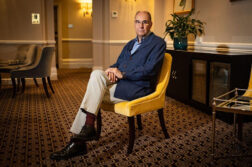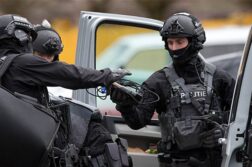May 17, 2017 – Voice of America
John Bolton, the prominent diplomat and former U.S. ambassador to the United Nations sat down for an exclusive interview with the Voice of America’s Persian service just days before the presidential election in Iran.
He said, “If free elections were held in Iran, Ayatollahs would be the losers.”
In an interview on May 17th, the former Undersecretary of State for International Security said, “I think the difference between moderates and extremists is a lie because only those can run for election whom pass Guardian Council’s screening and meet supreme leader’s approval.”
Portions of John Bolton’s interview follow:
Q: Mr. Ambassador, are you following the Iranian elections? Some critics had called it “selections” not “elections”. What is your opinion?
Bolton: I think the system that has been designed and established in Iran can be subjected to manipulation and fraud and has long been like that. Election candidates don’t have any mandates of their own in Iran. They are very carefully selected by Ayatollahs and only those of them who have been previously authorized by the Guardian Council and Supreme Leader will get final approval.
Government prepares the scene of elections somehow that in the eyes of the Iranian people and West seems democratic but regardless of the election result decision-making power is in the hands of Supreme Leader and I think some people believe that Rouhani is preselected.
Q: A bill titled as “Assets Transparency Law of Iran’s Leaders” have been submitted to the U.S. House of Representatives requires that American administration evaluates bank accounts of Ayatollah Khamenei, Rouhani the president and Qassem Soleimani, the Qods Force Commander, What do you think about it?
Bolton: I think this is a good idea and I think people know it very well that many of the Ayatollahs amassed their fortunes after the revolution, for example such as Rafsanjani family. This is the same corruption that revolution brings with itself and causes severe discontent of people. This indicates that revolution, regardless of its primary purposes, brought fraudulent results. If a truly free elections takes place in Iran, the Ayatollahs will lose, and then one can realize what the real opinions of people are.
Q: You mentioned May 19th presidential elections. There were televised debates among the candidates but none of them spoke about the leader’s replacement in the Islamic Republic because discussing this context was apparently prohibited. Do you think it is possible that one of these candidate succeed Ayatollah Khamenei. What signs and symptoms should West search for?
Bolton: There is much speculation about Khamenei’s successor. Ibrahim Raisi is one of the candidates and his candidacy in the elections is interestingly to place him in the public eyes not to be unknown person once he is replacing the current leader. Regardless of whether he wins or loses if the current leader dies or becomes disabled or resigns.
This is another kind of manipulation and fraud which is done by the leader. The Iranian regime to be monitored by any standard is not democratic system. They can impose their views on people replacing Supreme Leader which is an important position without any public debate. It’s quite an undemocratic process. Of course, this regime has no democratic structure. This is not a regime to have taken power based on a free and fair elections.
Q: How do you interpret the increased tensions between moderates and hardliners? Some are saying this is just a campaign slogan. What is your opinion?
Bolton: I think suggesting any difference between moderates and radicals is a lie, because only those candidates can be elected which are screened by the Guardian Council and approved by the Supreme Leader. So, there is no free and fair elections for the Iranian people. Especially, when it comes to such important and fundamental issues like nuclear activities. There is no difference between the two sides. Elections in Iran are generally not free, they use it only as a smokescreen to hide their secretive objectives.
Q: You did mention the economic benefits. You are in advisory board member of the “United against Nuclear Iran”. This group consist of former US officials who are warning European companies not to invest in Iran because their investments fall in the hands of IRGC who are controlling Iran’s economy. Don’t you think when European companies invest in Iran, they subconsciously are helping IRGC?
Bolton: I think this is one of the end results of the Joint Comprehensive Plan of Action (JCPOA) which was not taken into consideration. U.S. companies even if technically are allowed to deal with Iranian companies, always think about the consequences.
The U.S. Congress is considering new sanctions. Neither the Obama administration nor Tehran seemed not to have understood that sanctions imposed by U.S. were not just for the Iran’s nuclear activities but were for Iran’s support of terrorism. Since 1979 Iran has acted as the central international banker of terrorism and still is continuing doing it.
Q: What about the people of Iran? Sixty percent of the population is under 30 years of age who were born after the revolution. What is the strength of the regime and whether these youths are a threat to its existence, what is your opinion?
Bolton: This regime is not popular among the Iranians. Quite right, Iranian youth, who make up two-thirds of Iran’s population find through Internet and their friends about the possibility of having a different life in the world. I think, there are serious discontent among the people, especially in the economic field. We have recently witnessed protests by miners which was the most recent one of people’s protest. People know that all economic activities are in the interests of few Ayatollahs and IRGC commanders and not for the benefit of the people.
Regime’s power comes from IRGC. The Iranian regime is Mullahs government but a fascist religious government which only draws its power from the military. We’ve seen so far government’s response to protests. IRGC affiliated militia, IRGC and other related groups strongly suppressed voice of the people. So, a gap within the Iranian Revolutionary Guards would very likely result in the regime’s fall. But as long as the regime uses this force exclusively to suppress the people’s voice, it remains in power.
As the interview continued, Mr. Bolton responded to a question about how he would advise Mr. Trump in regards to Iran, by saying, “Basically I do not think that Ayatollahs are going to slow their nuclear or missile activities program. They have gained many advantages compare to minor concessions that are reversible: one hundred or one hundred and fifty billion of Iranian assets were released and the lifting of sanctions particularly in Europe which contributed great assistance to Iran’s economy. Despite all the concessions that have been given to Iran, Iran’s withdrawal seems unlikely and at the same time Iran’s missile program secretly continues.
“Nevertheless Iran didn’t gain all they wanted to win but it is important that the political leadership of America to know that the nuclear deal was not an honest deal and damaged the region and triggered a start of nuclear arms race in the region. The Saudis have started this race. Egypt and Turkey are planning to enter the arena.
“So regarding the agreement, the deal did not bring regional stability but brought with itself little success and provoked instability. As long as the nuclear activities of the regime is actually not stopped, the Iranian regime is dangerous: dangerous to people because of the regime’s actions and more dangerous for the region.”
In response to a question about regime increasing its military spending by 145%, and why it hasn’t spent the money it gained from nuclear accord in private sector, Mr. Bolton said, “When Iranian assets were released, an amount between 100 and 150 billion, arguments about the deal were controversial. Some believed the Iranian nuclear issue is resolved and Iran’s behavior will also change. They were false and that Iran’s behavior in order to further humiliate America and Western countries was more exposed.
Iran’s missile program is publicly executed after the deal and the nuclear program also secretly continues and no attention is paid to the nuclear deal. Perhaps in the mountains of North Korea with the agreement of its government activities are carried out that we are not able to discover it. Iran additionally is doing provocations in the Persian Gulf. This indicates that the Iranian regime has not changed any of its behavior.”



